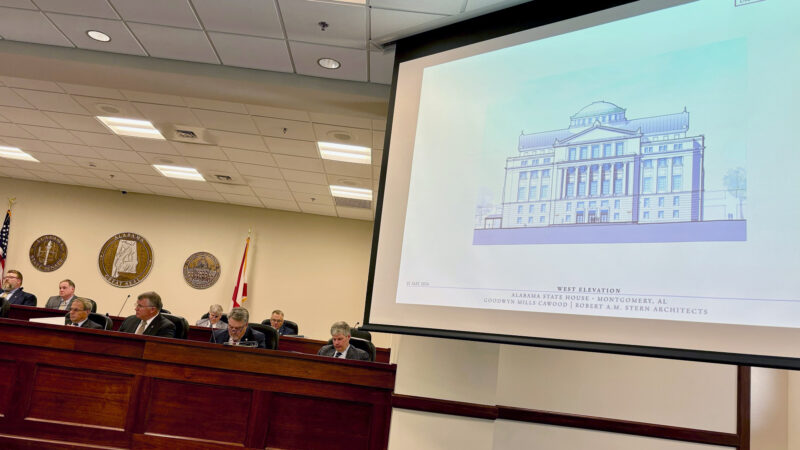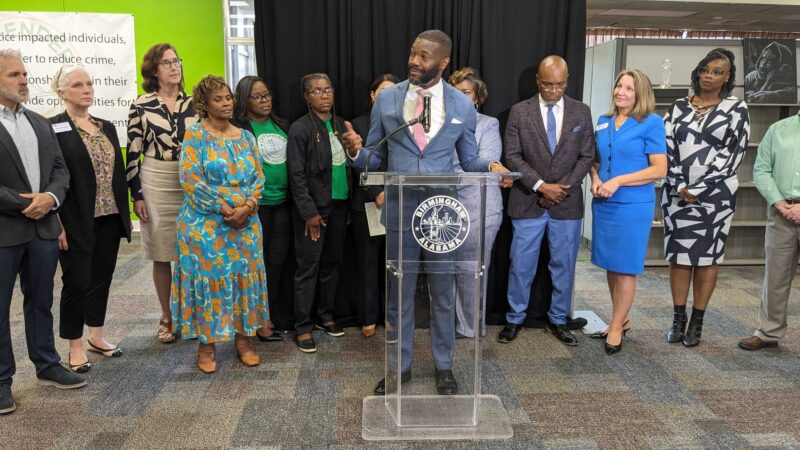A New Direction for Alabama’s Medicaid System
You might not realize how much of Alabama’s healthcare industry is supported by Medicaid. The program provides healthcare for almost a million low income residents. It pays for about a half of all childbirths in the state and two-thirds of nursing home patients’ care. Without Medicaid, Alabama’s healthcare system couldn’t function.
But Medicaid also takes a lot of money — about a third of Alabama’s non-education spending. And the costs keep rising. State Health Officer Don Williamson says when the recession hit, more people signed up for Medicaid. But taxes to pay for it didn’t go up. Then there’s the rising cost of healthcare generally. And there are fluctuations in how much Alabama’s dollars are matched by Washington.
“And the way those play together, almost always will force Medicaid to need more money every year.”
Under the Affordable Care Act, states could expand Medicaid eligibility. But Governor Robert Bentley chose not to. Still the Kaiser Family Foundation estimates Alabama can expect 58,000 new enrollees because of the “woodwork effect” — people looking for health insurance as provisions of the federal healthcare law kick in.
Williamson says Medicaid is actually pretty cheap on a per person basis, but it’s not very efficient.
“Medicaid doesn’t coordinate care well for clients. We have bad incentives in the system that tend to increase hospital utilization decrease outpatient services and increase emergency room visits.”
A New State Panel
Last fall, Governor Bentley tapped Williamson to lead the Alabama Medicaid Advisory Commission to look at how to improve efficiency and keep costs down. The group includes representatives from the healthcare system and political leaders. Wednesday they voted on turning Medicaid into a managed care system. There’s a commercial option, where the state pays a third party to run the program. The commission also examined a “community” option where the state handles it itself.
The commission voted in favor of the community option. Under the plan the state would be split into up to 12 regions, which can choose to stay community or contract with a commercial operator.
Jim Carnes is with the anti-poverty group Alabama Arise and he’s the lone consumer advocate on the panel. He believes managed care will make for a better Medicaid system.
“If you can coordinate care around the patient, then everybody wins. You get better results for that patient, a better experience, and costs are kept lower because you have fewer redundancies and fewer gaps.”
Not A Perfect Solution
The idea of managed care is nothing new. Many states have it and some have had it for years. Joan Alker with the Health Policy Institute at Georgetown University says it does offer better coordination of care, but savings may be elusive.
“I think what states like about managed care is that they get some budget certainty and predictability. But really there isn’t any strong evidence to show that over the long term managed care is going to save money.”
Not everyone is sold on the work of the Medicaid commission. Democratic House Minority Leader Craig Ford says when Governor Bentley appointed the lawmakers to the panel they were mostly Republicans.
“He appointed people to tell him what he wants to hear. And it’s just a dog and pony show.”
Ford thinks Alabama should raise its cigarette tax a dollar a pack to shore up Medicaid. But a bill to do that went nowhere in the last legislative session.
Alabama’s Medicaid Advisory Commission is expected to issue full recommendations later this month. But for any changes to actually happen, they must be approved by the legislature, which is a far higher bar than a mere commission report.
~ Andrew Yeager, January 18, 2013
Pro-Palestinian demonstration draws counter-protest at University of Alabama
Students gathered demanding the school call for a permanent and immediate ceasefire and to push the school to sever ties with defense contractor Lockheed Martin.
A new Statehouse and related projects will cost about $400 million
The Alabama Legislative Council, a 20-member panel comprised of legislative leaders and their appointees, approved the construction of the new Statehouse last year. The panel was given an update on the project on Wednesday.
New pilot program will offer housing, resources to people leaving prison
The Birmingham Reentry Alliance will provide wrap around services to dozens of men and women adjusting to life after prison.
Alabama committee advances ban on LGBTQ+ pride flags in classrooms
The Senate Education Policy Committee voted 5-2 for the House-passed bill, putting the proposal in line for a possible final passage in the last four days of the legislative session.
A New Orleans garden paid hundreds of dollars in fees for a sewer that doesn’t exist
Galvez Garden owner Lissie Stewart has been fighting the New Orleans Sewerage and Water Board over inaccurate billing for years.
Alabama coal mine keeps digging after hundreds of fines and a fatal explosion
Following the death of a grandfather, Crimson Oak Grove Resources has left a community afraid for their homes and lives. An expert warns one resident may need to evacuate her home while she still can.







